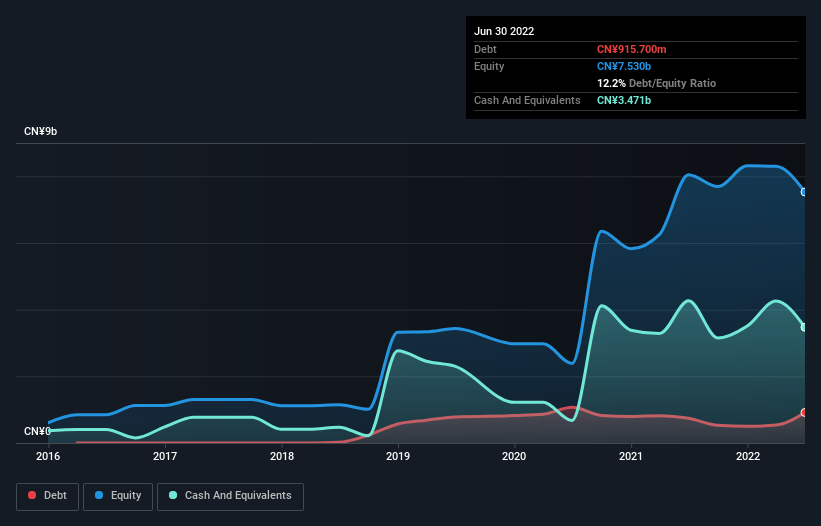Is Shanghai Junshi Biosciences (HKG:1877) A Risky Investment?

Legendary fund manager Li Lu (who Charlie Munger backed) once said, 'The biggest investment risk is not the volatility of prices, but whether you will suffer a permanent loss of capital.' So it seems the smart money knows that debt - which is usually involved in bankruptcies - is a very important factor, when you assess how risky a company is. As with many other companies Shanghai Junshi Biosciences Co., Ltd. (HKG:1877) makes use of debt. But should shareholders be worried about its use of debt?
When Is Debt A Problem?
Debt and other liabilities become risky for a business when it cannot easily fulfill those obligations, either with free cash flow or by raising capital at an attractive price. In the worst case scenario, a company can go bankrupt if it cannot pay its creditors. However, a more frequent (but still costly) occurrence is where a company must issue shares at bargain-basement prices, permanently diluting shareholders, just to shore up its balance sheet. Of course, the upside of debt is that it often represents cheap capital, especially when it replaces dilution in a company with the ability to reinvest at high rates of return. The first thing to do when considering how much debt a business uses is to look at its cash and debt together.
Our analysis indicates that 1877 is potentially undervalued!
What Is Shanghai Junshi Biosciences's Debt?
The image below, which you can click on for greater detail, shows that at June 2022 Shanghai Junshi Biosciences had debt of CN¥915.7m, up from CN¥741.0m in one year. But on the other hand it also has CN¥3.47b in cash, leading to a CN¥2.56b net cash position.

A Look At Shanghai Junshi Biosciences' Liabilities
Zooming in on the latest balance sheet data, we can see that Shanghai Junshi Biosciences had liabilities of CN¥1.39b due within 12 months and liabilities of CN¥969.9m due beyond that. Offsetting these obligations, it had cash of CN¥3.47b as well as receivables valued at CN¥245.5m due within 12 months. So it can boast CN¥1.36b more liquid assets than total liabilities.
This surplus suggests that Shanghai Junshi Biosciences has a conservative balance sheet, and could probably eliminate its debt without much difficulty. Simply put, the fact that Shanghai Junshi Biosciences has more cash than debt is arguably a good indication that it can manage its debt safely. There's no doubt that we learn most about debt from the balance sheet. But ultimately the future profitability of the business will decide if Shanghai Junshi Biosciences can strengthen its balance sheet over time. So if you're focused on the future you can check out this free report showing analyst profit forecasts.
Over 12 months, Shanghai Junshi Biosciences made a loss at the EBIT level, and saw its revenue drop to CN¥2.9b, which is a fall of 8.9%. That's not what we would hope to see.
So How Risky Is Shanghai Junshi Biosciences?
We have no doubt that loss making companies are, in general, riskier than profitable ones. And we do note that Shanghai Junshi Biosciences had an earnings before interest and tax (EBIT) loss, over the last year. Indeed, in that time it burnt through CN¥1.7b of cash and made a loss of CN¥1.6b. Given it only has net cash of CN¥2.56b, the company may need to raise more capital if it doesn't reach break-even soon. Overall, its balance sheet doesn't seem overly risky, at the moment, but we're always cautious until we see the positive free cash flow. When we look at a riskier company, we like to check how their profits (or losses) are trending over time. Today, we're providing readers this interactive graph showing how Shanghai Junshi Biosciences's profit, revenue, and operating cashflow have changed over the last few years.
If you're interested in investing in businesses that can grow profits without the burden of debt, then check out this free list of growing businesses that have net cash on the balance sheet.
New: Manage All Your Stock Portfolios in One Place
We've created the ultimate portfolio companion for stock investors, and it's free.
• Connect an unlimited number of Portfolios and see your total in one currency
• Be alerted to new Warning Signs or Risks via email or mobile
• Track the Fair Value of your stocks
Have feedback on this article? Concerned about the content? Get in touch with us directly. Alternatively, email editorial-team (at) simplywallst.com.
This article by Simply Wall St is general in nature. We provide commentary based on historical data and analyst forecasts only using an unbiased methodology and our articles are not intended to be financial advice. It does not constitute a recommendation to buy or sell any stock, and does not take account of your objectives, or your financial situation. We aim to bring you long-term focused analysis driven by fundamental data. Note that our analysis may not factor in the latest price-sensitive company announcements or qualitative material. Simply Wall St has no position in any stocks mentioned.
About SEHK:1877
Shanghai Junshi Biosciences
A biopharmaceutical company, engages in the discovery, development, and commercialization of various drugs in the therapeutic areas of oncology, metabolic, autoimmune, neurologic, nervous system, and infectious diseases in the People’s Republic of China.
Excellent balance sheet and fair value.

